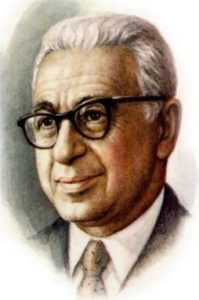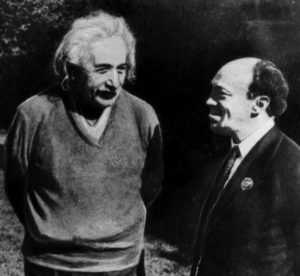 Matvei Isaakovich Blanter (1903-1990) was born in the Russian Empire in a small Ukrainian town. He studied music and became a master pianist and violinist. In the 1920s, Blanter became popular for his dance and jazz songs. After the rise of Stalin, he was “recruited” to write propaganda pieces and composed some of the Soviet Union’s greatest hits. In 1938, he wrote the music for the internationally-acclaimed song “Katyusha”, by far the most well-known Russian tune in the world. (Click here to listen.) It was so popular that it lent its name to one of Russia’s most famous military weapons: the Katyusha rocket. A recent poll found that it is still the 13th most listened to song in Russia. Also in 1938, Blanter wrote “The Football March”, which would be played before every Russian soccer game – and still is today! All in all, Blanter composed over 200 songs. He was awarded the Stalin Prize and the People’s Artist of the USSR. In the last days of World War II, Stalin sent Blanter to Berlin to compose a victory symphony. He wound up with the Russian general right when a German delegation came to sue for a peace treaty. Blanter was quickly shoved into a tiny closet while the generals negotiated. Running out of air, he passed out and fell out of the closet, embarrassing everyone in the room. Some say this is the origin of the expression to “come out of the closet”.
Matvei Isaakovich Blanter (1903-1990) was born in the Russian Empire in a small Ukrainian town. He studied music and became a master pianist and violinist. In the 1920s, Blanter became popular for his dance and jazz songs. After the rise of Stalin, he was “recruited” to write propaganda pieces and composed some of the Soviet Union’s greatest hits. In 1938, he wrote the music for the internationally-acclaimed song “Katyusha”, by far the most well-known Russian tune in the world. (Click here to listen.) It was so popular that it lent its name to one of Russia’s most famous military weapons: the Katyusha rocket. A recent poll found that it is still the 13th most listened to song in Russia. Also in 1938, Blanter wrote “The Football March”, which would be played before every Russian soccer game – and still is today! All in all, Blanter composed over 200 songs. He was awarded the Stalin Prize and the People’s Artist of the USSR. In the last days of World War II, Stalin sent Blanter to Berlin to compose a victory symphony. He wound up with the Russian general right when a German delegation came to sue for a peace treaty. Blanter was quickly shoved into a tiny closet while the generals negotiated. Running out of air, he passed out and fell out of the closet, embarrassing everyone in the room. Some say this is the origin of the expression to “come out of the closet”.

Mikhoels with Albert Einstein, during his 1943 fundraising tour
Blanter’s uncle was Shlomo Mikhoels (1890-1948). Born in Latvia to a religious Jewish family, he studied law in St. Petersburg before joining a Jewish theatre group. In 1920, Mikhoels co-founded the first Jewish acting studio in Moscow, putting on plays in Yiddish. Lenin soon turned it into the official State Jewish Theatre. By 1928, Mikhoels had become the theatre’s director, as well as its most famous actor. People came from around the world to see his legendary performances. One New York Times reviewer wrote that Mikhoels had put on “one of the most stirring performances of my theatre-going career.” His 1935 role as King Lear (in Yiddish) drew another critic to write: “I do not recall a performance that stirred me as profoundly, to the core, as Mikhoels’ performance of Lear.” Mikhoels had become one of the world’s best Shakespearean actors. He also played Rabbi Alter in Mazel-Tov, and Tevye in the Russian version of Fiddler on the Roof, among many other roles. In 1942, Mikhoels was made chairman of the Jewish Anti-Fascist Committee, and sent around the world to draw support from his fellow Jews for the Soviet war effort against the Nazis. This made him the first official Soviet representative to make such a trip, and he successfully raised millions. However, after the war ended Stalin became increasingly paranoid, and soon began another round of his purges, particularly of Jewish intellectuals. In 1948, he ordered Mikhoels assassinated, and made it look like a car accident. Nonetheless, Mikhoels was given a state funeral. Today, he is recognized as an important artist and pioneer of Russian theatre, and one of Moscow’s main cultural centres is named after him.
Words of the Week
He who has many friends has no friends.
– Aristotle
